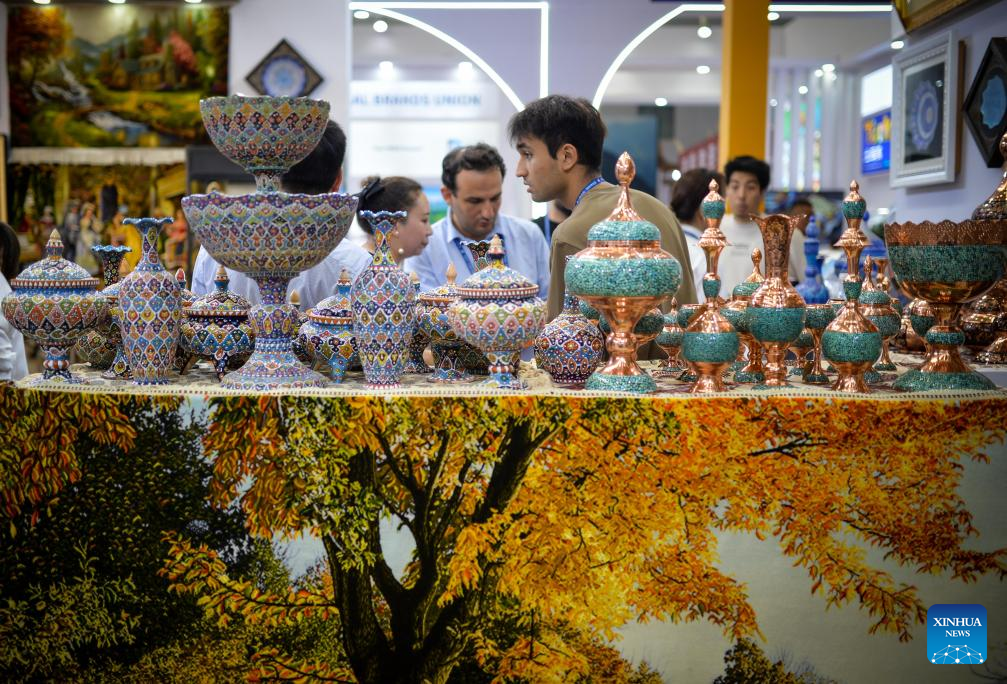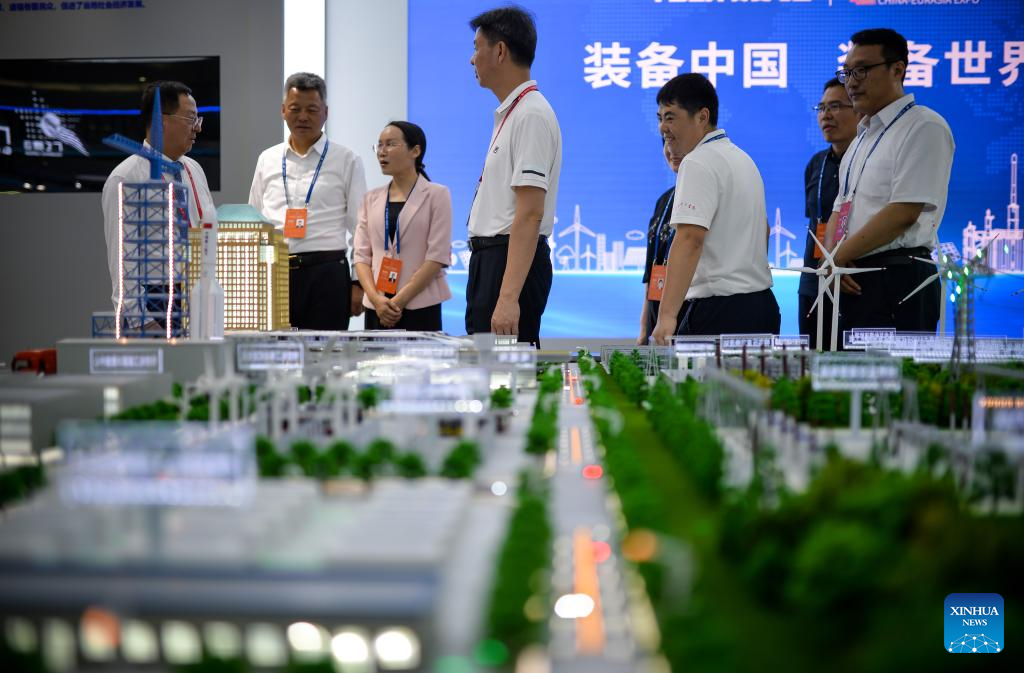
People purchase goods at the 8th China-Eurasia Expo in Urumqi, northwest China's Xinjiang Uygur Autonomous Region, June 26, 2024. The 8th China-Eurasia Expo, held at the Xinjiang International Convention and Exhibition Center at the foot of the Tianshan Mountains, commenced Wednesday in Urumqi, northwest China's Xinjiang Uygur Autonomous Region. Themed "New Opportunities of Silk Road, New Vitality for Eurasian Cooperation," the expo will run until Sunday. It has drawn over 1,900 participants from 50 countries, regions and international organizations, showcasing over 6,000 varieties of products. (Xinhua/Li Renzi)
URUMQI, June 26 (Xinhua) -- Businessmen from many parts of the world have converged in northwest China's Xinjiang, displaying exquisite goods such as French wine, Serbian coffee, Australian chocolate, and Ghanaian drums.
The 8th China-Eurasia Expo, held at the Xinjiang International Convention and Exhibition Center at the foot of the Tianshan Mountains, commenced Wednesday in the regional capital of Urumqi.
Themed "New Opportunities of Silk Road, New Vitality for Eurasian Cooperation," the expo will run until Sunday. It has drawn over 1,900 participants from 50 countries, regions and international organizations, showcasing over 6,000 varieties of products.
"This is our first time participating in the China-Eurasia Expo, and we hope to achieve fruitful results here in Xinjiang," said Nebojsa Terzic at the Serbian pavilion. He believes that the event will further cultivate Chinese consumers' appetite for high-quality Serbian products.
Covering an area of 140,000 square meters, this year's expo encompasses four major exhibition zones covering investment cooperation, international exhibition, special industries, and equipment manufacturing.
"We have brought multiple exhibits, including lightweight construction machinery, recyclable construction elevators, and a 5G tower crane simulation cockpit," said Zhang Heng, general manager of the Xinjiang branch of China Construction Third Engineering Bureau Group Co., Ltd.
Attributing their rapid overseas expansion to the deepening of the Belt and Road Initiative, Zhang expects more collaboration with overseas clients. "We're already close to finalizing a project in Kazakhstan," Zhang added.
This year's expo has also set up a special pavilion for the China (Xinjiang) Pilot Free Trade Zone (FTZ), aiming to showcase its unique features, progress, and achievements of three areas in Urumqi, Kashgar and Horgos.
As the first pilot FTZ in China's northwest border areas, Xinjiang FTZ was officially established in November 2023. The FTZ has since embarked on an array of reform initiatives, marking a robust start to its development.
From January to April this year, the total import and export volume of the Xinjiang FTZ reached 38.5 billion yuan (about 5.4 billion U.S. dollars), accounting for 27.92 percent of the total import and export volume of Xinjiang.
Frances Wu, an exhibitor from Australia, spoke highly of Xinjiang's geographical advantage of being close to Central Asia. The company hopes to leverage this expo to gain in-depth understanding of policies of the Xinjiang FTZ, and intends to invest and establish factories in Xinjiang, with the aim of processing high-quality Kazakh camel milk powder.
"Being close to the source of raw materials, if we can establish production facilities in Xinjiang, the market prospects for our products will undoubtedly be very promising," he noted.
Li Xuan, an official at the regional department of commerce, stated that Xinjiang will fully leverage the platform function of the China-Eurasia Expo to develop public service products that facilitate exchanges and collaboration among countries in Asia and Europe.
Since 2011, the China-Eurasia Expo has successfully held seven sessions, yielding fruitful results. During past expos, more than 12,200 domestic and foreign exhibitors from more than 70 countries and regions exhibited, and it attracted a total of 2.16 million visitors. ■

People visit a booth at the 8th China-Eurasia Expo in Urumqi, northwest China's Xinjiang Uygur Autonomous Region, June 26, 2024. (Xinhua/Li Renzi)



